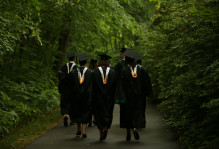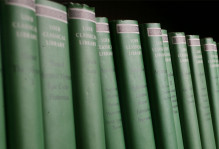A memo to prospective students – If you have the choice, I think that you should attend W&M over UVA.
I originally wrote this post last February. In my view, it still holds true for students considering enrollment at William & Mary in fall 2010.
Every year, tens of thousands of students include W&M and UVA among their top choices when considering where to attend college. U.S. News and World Report and other outlets regularly include both institutions among the very best universities in the land, both for the quality of their undergraduate programs and for their relative affordability. Personally, I’ve taught a couple of classes at UVA over the years, regularly visit and enjoy the University and city of Charlottesville, and back in the day spent 18 wonderful months there as a graduate student and teaching assistant in economics.
But….
After two decades of working with students and faculty at the College of William and Mary and living in Williamsburg, I think that there are a lot of good reasons why the best students should prefer to attend W&M. Here are a few of them.
1. Although UVA prides itself on close faculty-student relationships, they cannot possibly touch the level of constructive engagement that occurs at W&M because of our smaller size. In contrast to UVA and most other large universities, every first-year student at W&M completes a freshman seminar (comprised of 15 or fewer students) in which they work closely with a faculty member on a topic of mutual interest. Freshmen at UVA and other large state “U’s” seldom get to interact much with full time faculty and instead take almost all of their classes in large lecture halls with hundreds of other students.
2. In contrast to UVA, every single freshman and transfer student at W&M is assigned a faculty advisor with whom they meet multiple times during their first year of college. We don’t rely on centralized advising offices staffed by non-faculty. At W&M, professors handle most academic advising. The intellectual and social transition into university life can be difficult and even scary for a new student. Our advising system, which is fairly unique for public institutions of any size, helps smooth this transition and ensures that new students are enrolled in the classes that are right for them. If a new student is having academic difficulties, we generally identify the problem early and get that student the help he or she needs.
3. There are a few courses at W&M where teaching assistants – graduates students who teach undergraduates in exchange for monetary compensation or as part of their own graduate programs – play an important and frankly valuable role. But at UVA, I know, undergraduates often feel like teaching assistants are almost ubiquitous. Their introductory politics and economics classes, for example, typically feature two fifty-minute sessions of lecture per week by a full time faculty member (often taking place in large lecture halls) and a third, smaller, “discussion” session led by a graduate student. Go to UVA as a freshman, and my guess is that most of your personal interactions with instructors will occur with teaching assistants, rather than full-time members of their faculty. At W&M, you will work almost exclusively with professors, not graduate students.
4. Although both institutions – indeed, most colleges and universities across the country – emphasize in their promotional materials the importance of collaboration on research between faculty and undergraduates, at W&M we actually “walk the walk” on undergraduate research. Take a look at the remarkable research opportunities that Professor Margaret Saha and her colleagues in our biology department have made available to a generation of W&M undergraduates. Or consider the collaborative opportunities that Professor Mike Tierney and his colleagues in “Project PLAID” offer to students interested in international aid. Every summer, there are literally hundreds of undergraduate students working in Williamsburg on professional quality research with members of our faculty. Indeed, W&M typically provides these students with free housing in one of our best dorms to help them make the financial ends meet. There is no definitive data, but I am convinced that there is no other college or university in the country that involves a larger percentages of its undergraduates in meaningful research collaborations with faculty than does W&M.
5. As befits a major state university with many outstanding graduate programs, there are a number of nationally-renown scholars at UVA. Still, although the size of our faculty is smaller, the intellectual records and national stature of my colleagues at William and Mary regularly impress me. For an illustration, consider just one of our departments, History. Within that department, Professor Melvin Ely recently won the Bancroft Prize, which is awarded annually for the best work published each year in American history. Professor Scott Nelson’s monograph about the folk hero, John Henry, recently won the top annual award for the best book published about U.S. social and cultural history. And here’s the clincher. W&M faculty have won the “Commonwealth of Virginia Outstanding Faculty Award,” the most prestigious prize for college professors in the state, more often than any other college or university, including UVA, even though the size of our faculty is much, much smaller than is the one in Charlottesville.
6. In fairness, I think that you are more likely to see future members of the NFL or NBA participating in intercollegiate sports at UVA (although do check out this great video about Super Bowl winning coach Mike Tomlin’s fond reflections on attending W&M). The “grounds” at UVA are physically beautiful, as is our campus in Williamsburg. And I’m pretty sure that the parties that occur in Charlottesville are bigger, noisier, and maybe even better than what you will find here. But after two decades and countless visits to other universities, I have come to believe that W&M students are special. There is a student culture here of genuineness, courtesy, individuality, and seriousness of purpose. I can’t fully describe that sense of community, exactly, but I do feel strongly that it is remarkable and real. Whenever I invite an academic expert or policy practitioner to campus to meet with my classes, for example, these folks invariably comment about how impressive and special are our students. Often, they tell me that they wish their own children could have had, or will have, the chance to study here.
I could go on, but you get the drift. There’s a lot to admire about UVA. But I firmly believe that for highly talented and dedicated young people who have the option, the best choice for them is to join the remarkable community of learning that we have at the College of William and Mary.




No comments.
Comments are currently closed. Comments are closed on all posts older than one year, and for those in our archive.